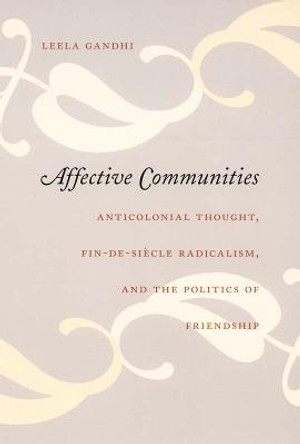Description
Gandhi weaves together the stories of a number of South Asian and European friendships that flourished between 1878 and 1914, tracing the complex historical networks connecting figures like the English socialist and homosexual reformer Edward Carpenter and the young Indian barrister M. K. Gandhi, or the Jewish French mystic Mirra Alfassa and the Cambridge-educated Indian yogi and extremist Sri Aurobindo. In a global milieu where the battle lines of empire are reemerging in newer and more pernicious configurations, Affective Communities challenges homogeneous portrayals of "the West" and its role in relation to anticolonial struggles. Drawing on Derrida's theory of friendship, Gandhi puts forth a powerful new model of the political: one that finds in friendship a crucial resource for anti-imperialism and transnational collaboration.
Illuminates the history of western anti-imperialism through the stories of a number of specific friendships that flourished between South Asians and Europeans between 1878 and 1914
About the Author
Leela Gandhi teaches at La Trobe University in Melbourne, Australia. She is the author of Postcolonialism: A Critical Introduction, a coauthor of England in Twentieth-Century Fiction: Through Colonial Eyes, and a coeditor of the journal Postcolonial Studies.
Reviews
"Affective Communities is outstanding. It stretches postcolonial theory well beyond its usual boundaries. Leela Gandhi successfully documents the anti-imperial affiliations and politics of certain marginalized subcultures in late-nineteenth-century Britain and Europe, and she shows what Indian nationalists owed to these traditions."-Dipesh Chakrabarty, author of Provincializing Europe: Postcolonial Thought and Historical Difference
"A very original and thought-provoking book, Affective Communities offers an outstanding contribution to postcolonial and queer studies. Leela Gandhi provides detailed, brilliant discussions of particular figures such as Edward Carpenter, Henry Salt, and M. K. Gandhi and the ways in which they interwove their various radical counter-cultural interests into larger political strategies of anticapitalist utopianism."-Robert J. C. Young, author of Postcolonialism
"Affective Communities is an important book that challenges the founding principles of postcolonial theory not in order to reject its ambitions but to open new ways to approach these urgent issues. . . . This book is hard to put down, but it also invites frequent rereading as a guide and as a reformulation of the theoretically and politically complex terrain of anti-colonial and postcolonial theorising." -- Linnell Secomb * Postcolonial Studies *
"I admire the passion, integrity, and brilliance with which [Gandhi] makes her case. . . . This is a book to be savoured for its suggestive insights. . . . Its intellectual energy derives . . . from Gandhi's inventive retrieval and analysis of forgotten texts . . . . " -- Seth Koven * International History Review *
Book Information
ISBN 9780822337034
Author Leela Gandhi
Format Hardback
Page Count 264
Imprint Duke University Press
Publisher Duke University Press
Weight(grams) 522g

![Affective Communities: Anticolonial Thought, Fin-de-Siecle Radicalism, and the Politics of Friendship by Leela Gandhi 9780822337034 [USED COPY] Affective Communities: Anticolonial Thought, Fin-de-Siecle Radicalism, and the Politics of Friendship by Leela Gandhi 9780822337034 [USED COPY]](https://cdn11.bigcommerce.com/s-zkx5lhzlf8/images/stencil/608x608/products/6584371/6661292/9780822337034__80306.1738900772.jpg?c=1)


